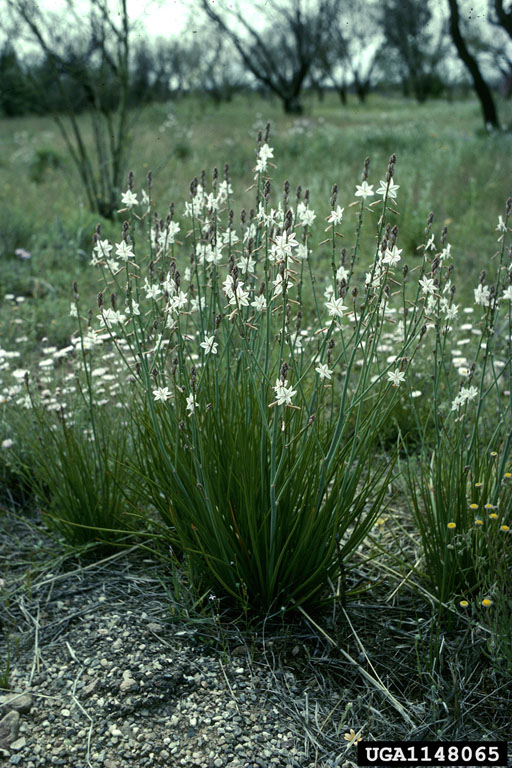 Onionweed - August 17, 2005 Jeff Schalau, County Director, Associate Agent, Agriculture & Natural Resources Arizona Cooperative Extension, Yavapai County Last week’s column was titled “Invasive Species and Responsible Gardening”. In it, I tried to increase your awareness about invasive species and provide some examples where good intentions backfired. Education and awareness are essential steps in invasive species management and just because a plant appeals to you does not mean it should be cultivated. This week, we will look at a local example. Onionweed (Asphodelus fistulosus) is an attractive herbaceous perennial in the lily family. It has six-petalled, white flowers. Each petal has a thin chocolate brown stripe in its center. The plant is usually about a foot tall and almost as wide. Clusters of long, tapering, round, hollow leaves very much resemble chives or scallions. Leaves sprout after winter rains, flowers appear in spring, and plants die to the ground during dry season. Onionweed is an aggressive invasive species that was introduced as an ornamental. Once established, it easily escapes cultivation into surrounding unirrigated land. It seeds prolifically and can establish large populations quickly. It is unpalatable to livestock and wildlife. To date it tends to invade disturbed ground, so it is unclear whether it will be a threat to natural communities. Native to southern Europe, Mediterranean Africa, and Western Asia. According to the Arizona-Sonoran Desert Museum in Tucson, onionweed plants may have been introduced into the United States in the 1980s. They were offered for sale in Alpine, Texas and Phoenix, Arizona as early as 1984. Some of the original U.S. plants were collected from a naturalized population near Saltillo, Coahuila, Mexico, where the species was documented in 1930. In the United States onionweed occurs in California (in several coastal southern counties), New Mexico, Texas, and Arizona. In Arizona, it is documented in Pima and Santa Cruz Counties. There is also a small population on private property in Sedona. Onionweed is a federally listed noxious weed in the U.S. This means that it is illegal to knowingly sell, purchase, barter, exchange, give, or receive this plant. It is also on several state noxious weed lists including Alabama, California, Florida, Massachusetts, Minnesota, New Mexico, North Carolina, Oregon, South Carolina, and Vermont. You may wonder why it is on some state’s noxious weed list when it does not yet occur there. This is because they don’t want it and will be able to manage it immediately if it ever does appear. Prevention is one of the best noxious/invasive species management strategies. To view pictures of onionweed, go to the Arizona-Sonoran Desert Museum Invaders web site at www.desertmuseum.org/invaders/. If you find onionweed on your property, you should remove it. The best way to control a small population is to dig it out including the root system. Pulling without digging is ineffective because the roots will resprout. Translocated herbicides can also be used to control larger populations. On another topic, the 2005 Arizona Highlands Garden Conference will be on October 3 and 4, 2005 at the Trinity Heights Methodist Church in Flagstaff. Three nationally recognized speakers will be there. Forrest McDowell and Tricia Clark-McDowell, authors and owners of Cortesia Sanctuary Gardens in Eugene, Oregon will be speaking about Sanctuary Gardening. Jim Knopf, landscape architect and author from Boulder, Colorado will be speaking on the Principles of Xeriscape. Several other speakers will also be speaking on topics such as horticultural therapy, seed saving, permaculture, attracting birds, healing gardens, roses, native plants, container gardening, hydroponics, and water harvesting. For more information and registration materials, visit the Yavapai County Cooperative Extension web site (cals.arizona.edu/yavapai/) or call the Coconino County Cooperative Extension office at (928) 774-1868. The University of Arizona Cooperative Extension has publications and information on gardening and pest control. If you have other gardening questions, call the Master Gardener line in the Cottonwood office at 646-9113 ext. 14 or E-mail us at mgardener@verdeonline.com and be sure to include your address and phone number. Find past Backyard Gardener columns or submit column ideas at the Backyard Gardener web site: http://cals.arizona.edu/yavapai/anr/hort/byg/. |